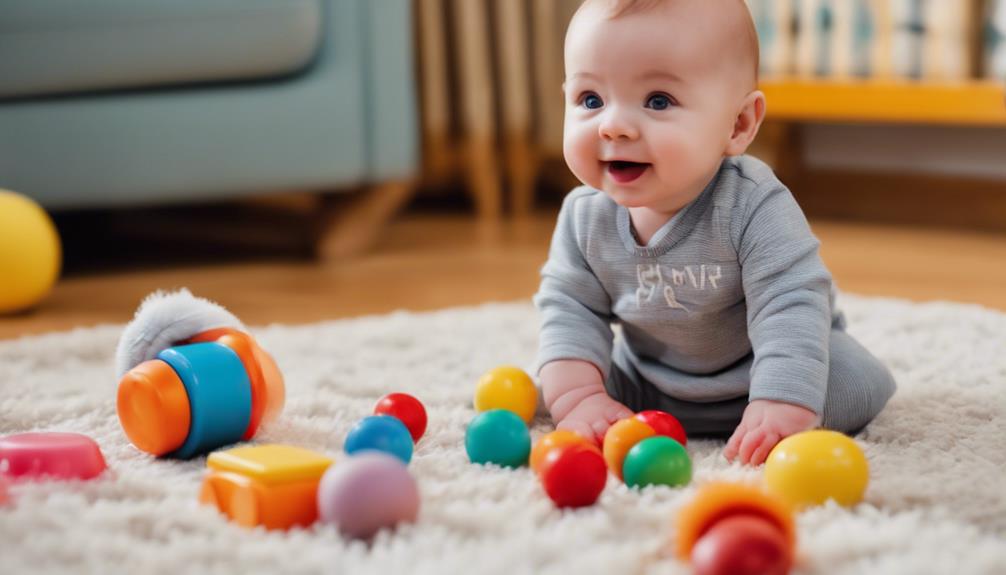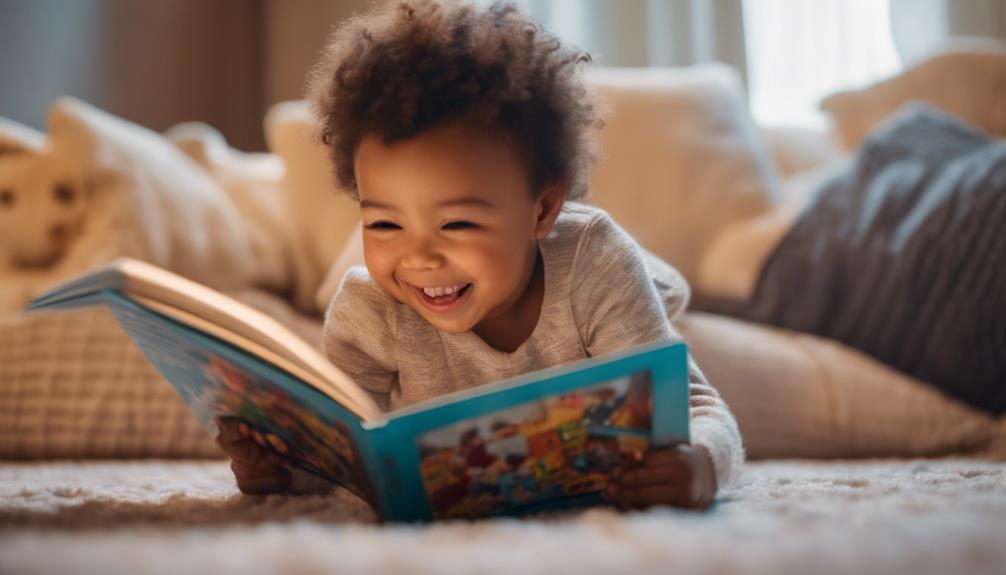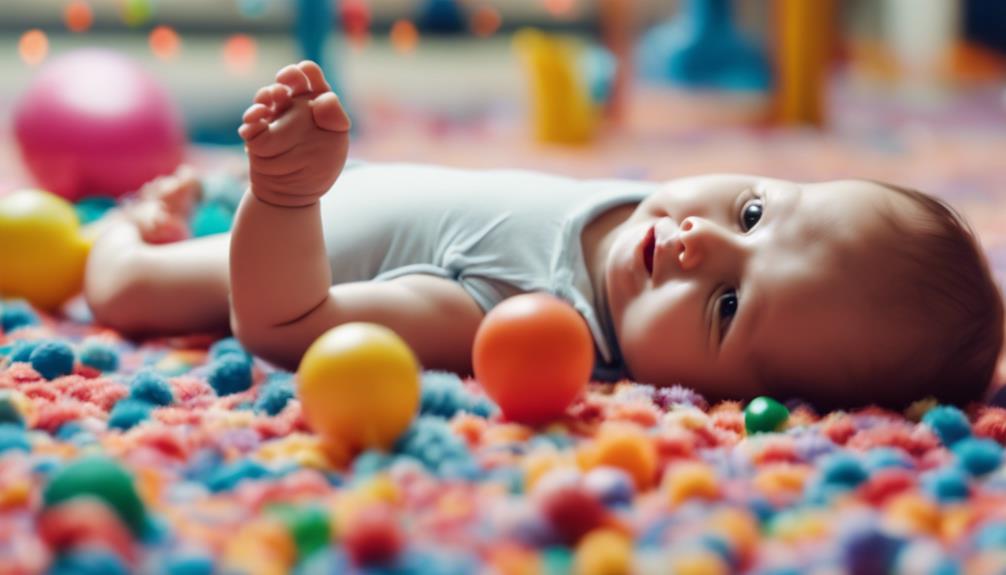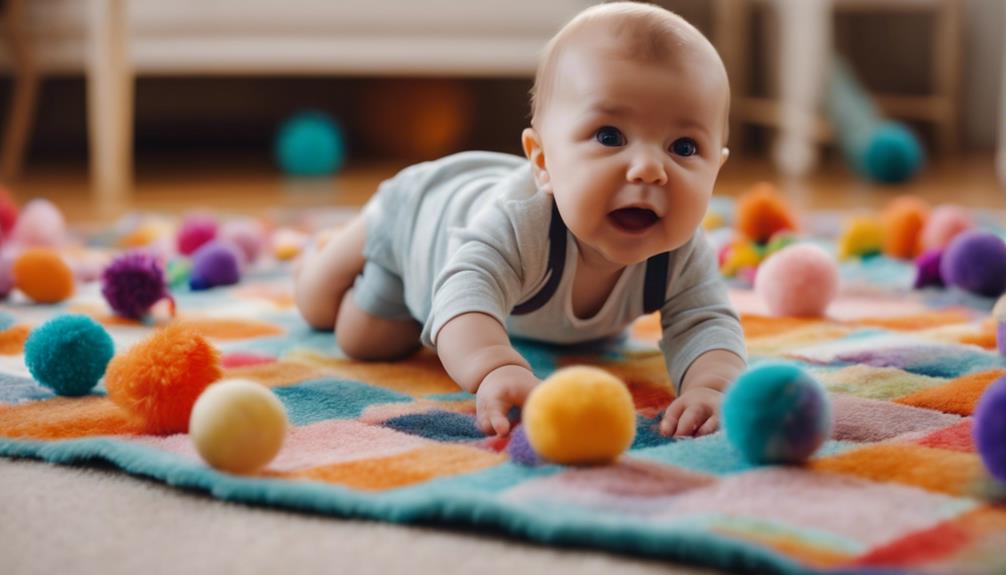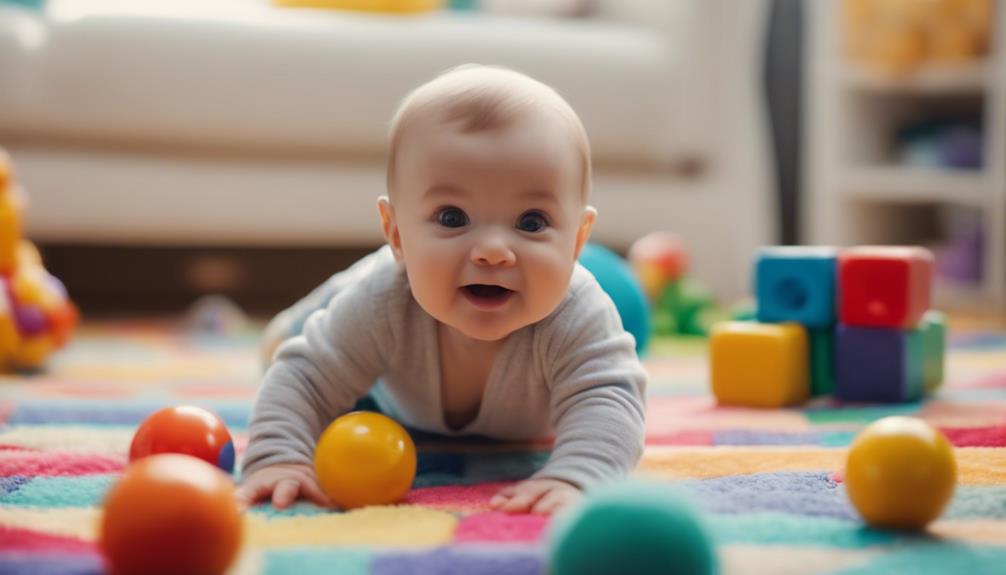At 6 months, your baby recognizes familiar faces, enjoys interactive play such as peek-a-boo, and reflects emotions around them. Participating in activities like peek-a-boo and pat-a-cake can enhance social skills. It is common for separation anxiety to manifest as clinginess and fear of strangers, demonstrating the strong bond with you. Encouraging positive interactions can cultivate joy and connection, supporting cognitive and emotional development. Responding to your baby’s cues helps to establish trust and security. Eye contact and smiles reinforce social connections, while relationships with caregivers shape their sense of belonging and emotional ties. These milestones lay the foundation for future social interactions.
Key Takeaways
- 6-month-old babies recognize familiar faces and show preferences.
- Interactive play activities like peek-a-boo enhance social and cognitive development.
- Separation anxiety may occur, indicating a healthy bond with caregivers.
- Positive interactions with caregivers foster secure attachments and social connections.
- Caregiver responsiveness influences social skills and emotional connections.
Social Interaction and Preferences
By 6 months, your baby begins to show preferences in social interactions and interactions with familiar faces. This significant stage marks the beginning of your little one's social and emotional development.
At this age, babies start recognizing familiar faces and may display a preference for certain individuals in their lives, such as family members. They delight in playing with others, engaging in simple games like peek-a-boo to foster social bonds.
Additionally, babies at 6 months may find joy in looking at their reflection in a mirror, showing early signs of self-awareness. Importantly, they begin responding to the emotions of those around them, often mirroring happiness and smiling in response to positive interactions.
Through various vocalizations, 6-month-olds express their emotions, conveying happiness or displeasure during social interactions. This period is significant for laying the foundation of your baby's social skills and emotional intelligence.
Playing and Engagement
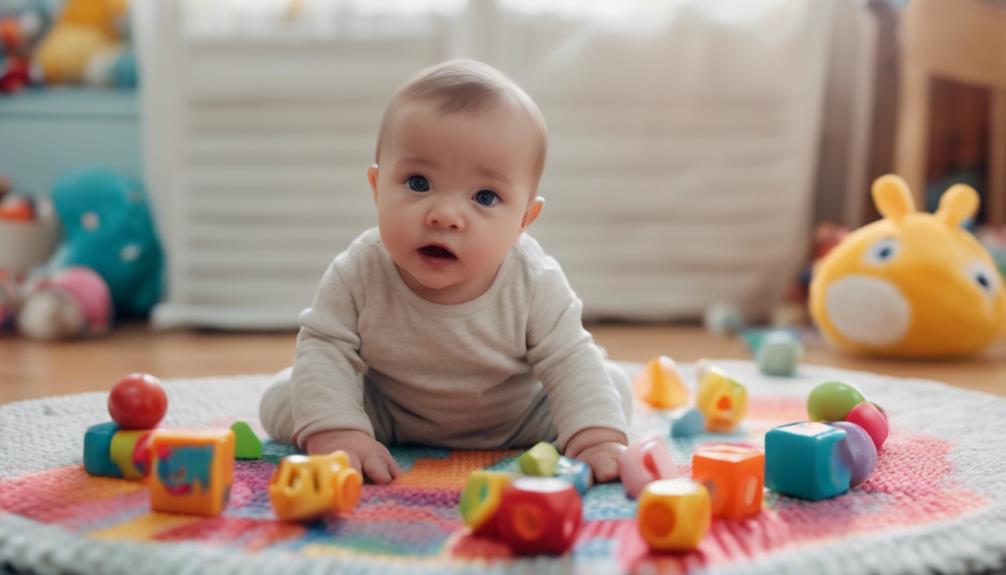
At 6 months, your baby starts to engage in interactive play activities like peek-a-boo and pat-a-cake, fostering bonding experiences with caregivers. This type of play not only strengthens your relationship but also aids in your baby's social development.
Through these activities, your little one begins to learn about taking turns and develops essential social skills for future interactions.
Interactive Play Activities
Engage actively with your 6-month-old baby through interactive play activities to promote cognitive and social development. At this stage, your baby is reaching important developmental milestones through play. Encourage peek-a-boo games to help them understand object permanence as you disappear and reappear. Stimulate their senses with colorful and textured toys, aiding in exploration during playtime. Engage in back-and-forth play with toys, fostering turn-taking and hand-eye coordination. Singing and dancing with your baby not only enhances their sense of rhythm and movement but also supports their social and emotional growth. Additionally, involving family members in interactive play can strengthen bonds, creating a sense of security and belonging for your little one.
| Interactive Play Activities | |
|---|---|
| Peek-a-boo games | Back-and-forth play |
| Colorful toys | Singing and dancing |
| Textured toys | Family involvement |
Bonding Through Play
Strengthen your bond with your 6-month-old baby through playful interactions and engagement, fostering trust and emotional development. Playing and engaging with your little one not only creates joyful moments but also contributes greatly to their social and emotional growth.
By participating in interactive play activities, such as peekaboo, you're aiding your baby in understanding the concept of object permanence and building a foundation of trust within your relationship. At 6 months, babies begin to recognize emotions and learn how to express their feelings through playful interactions.
Engaging with toys and caregivers in play also plays an important role in enhancing language development and social skills in infants. As your baby explores different textures, sounds, and movements during playtime, their cognitive development is further stimulated, laying the groundwork for future learning and understanding.
These developmental milestones are essential in nurturing a strong bond with your little one while promoting their overall growth and well-being.
Developmental Benefits of Play
Playing and engaging with your 6-month-old baby not only creates joyful moments but also contributes significantly to their social and emotional development. Through interactive play, such as peekaboo or playing with toys, your baby begins to explore the world around them, leading to emotional milestones. These interactions help in developing social skills by learning about emotions and understanding how to interact with others.
By engaging in play, you aren't only fostering a bond with your baby but also providing them with a sense of security that's vital for their overall well-being. Additionally, playtime allows your baby to learn important skills like cause and effect, turn-taking, and problem-solving, which are essential for their cognitive and emotional development.
Encouraging exploration and curiosity through play will further enhance your baby's social interactions and communication skills, setting a strong foundation for their future social development.
Responsiveness to Social Cues
By six months of age, your baby's responsiveness to social cues becomes increasingly apparent as they recognize familiar faces and react to various emotions. This stage marks a significant development in their social awareness and interactions. Your baby may enjoy engaging in simple games like peek-a-boo, displaying joy and interest when looking at their reflection in a mirror, and responding to different emotions with sounds and facial expressions. At this age, babies start to differentiate between familiar faces and strangers, showing early signs of social recognition. This responsiveness to social cues lays the foundation for future social interactions and relationships.
| Social Cue | Description | Example |
|---|---|---|
| Recognizing Familiar Faces | Babies at 6 months can distinguish between familiar faces and strangers. | Your baby smiling and reaching out to you when you enter the room. |
| Reacting to Emotions | They start responding to various emotions expressed by caregivers. | Your baby giggling when you laugh or making sounds when they see you frown. |
| Enjoying Interactive Games | Simple games like peek-a-boo can bring joy and engagement to your baby. | Your baby laughing and squealing in delight when you play peek-a-boo with them. |
Signs of Separation Anxiety
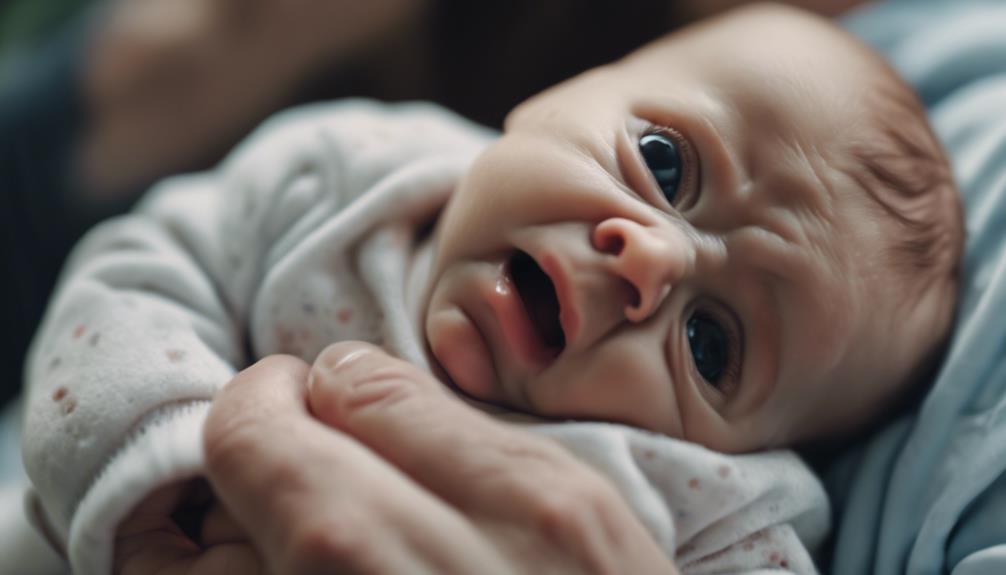
Experiencing signs of separation anxiety, a 6-month-old baby may exhibit distress when separated from their primary caregiver. This development is an important occurrence at this age as babies start to form strong attachments to familiar faces.
Signs of separation anxiety include crying, clinginess, fear of strangers, and unease when alone. It's vital to understand that separation anxiety is a normal part of a baby's development and signifies a healthy bond between the baby and their caregiver.
As highlighted by experts, establishing comforting routines and building trust can help ease separation anxiety in a 6-month-old. According to Dr. Smith, a child psychologist, 'Babies at this age begin to understand object permanence, which means they know you still exist even when they can't see you. This newfound awareness can trigger separation anxiety as they seek comfort and security from their primary caregiver.'
As a result, it's important for caregivers to provide reassurance and support during this phase of growth.
Encouraging Positive Interactions
To enhance your 6-month-old baby's social development, focus on encouraging positive interactions through engaging activities and supportive environments.
Engage in activities like peek-a-boo to foster connection and joy with your little one. This simple game not only brings laughter but also helps your baby learn about object permanence and develop trust in relationships.
It's vital to help your baby recognize familiar faces and differentiate between strangers. This practice enhances their social awareness and builds a sense of security.
Interactive games that involve turn-taking and responsive communication are great for promoting social skills. By playing such games, you're helping your baby learn about sharing, taking turns, and understanding non-verbal cues.
Create a nurturing environment where your baby can explore emotions and expressions freely. Using gentle and loving tones when interacting with your baby fosters a positive and secure attachment, important for their social development.
Fostering Secure Attachments
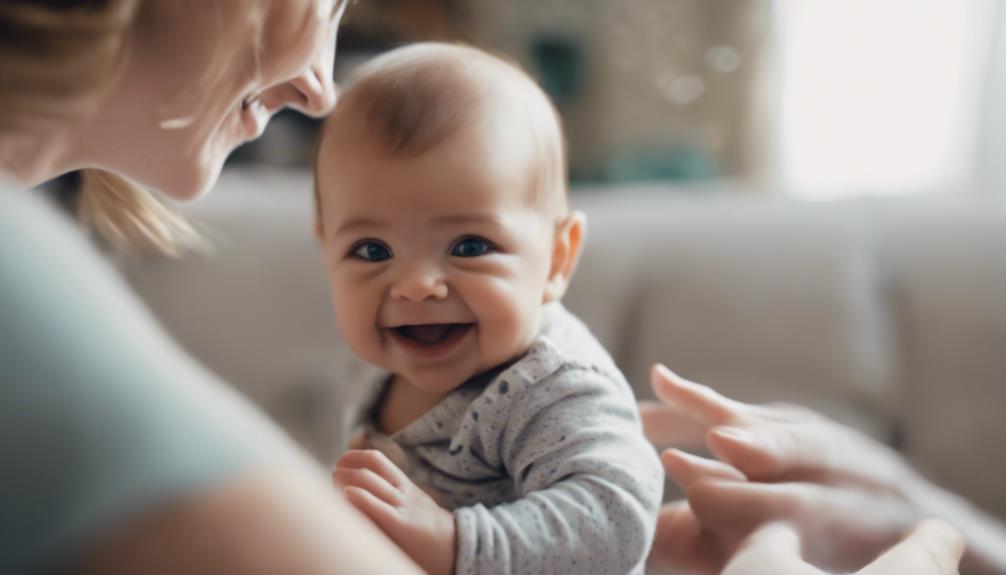
Consistently responding to your baby's cues and needs is essential for fostering secure attachments. By being attentive and responsive, you're building a strong foundation of trust and security for your little one. Encouraging positive interactions with familiar faces can further enhance this sense of attachment.
Interacting with family members or regular caregivers allows your baby to form lasting relationships based on familiarity and comfort. According to child development experts, 'Babies thrive when they've consistent interactions with familiar faces, as it helps them feel secure and loved.'
In addition to familiar faces, creating a safe and nurturing environment is critical for your baby's social development. By providing a secure space for exploration and play, you're facilitating the building of confidence and independence. Establishing predictable routines and rituals also contributes to your baby's sense of security.
Psychologist Dr. Smith notes, 'Predictable routines help babies feel safe and develop a sense of stability in their daily lives.' By incorporating these strategies, you're actively fostering secure attachments that are essential for your baby's social development.
Building Social Connections

At 6 months old, your baby's social connections start to blossom. Making eye contact is important, as it helps in recognizing familiar faces and understanding emotions.
When your baby responds with smiles and sounds, they're showing engagement and building bonds through social play.
Eye Contact Importance
Making eye contact with your 6-month-old baby is essential for fostering social connections and building strong bonds with them. Eye contact plays a pivotal role in helping babies recognize familiar faces and develop attachments to their caregivers.
It serves as a fundamental form of nonverbal communication through which infants learn to express their emotions effectively. At 6 months old, babies begin engaging in more intentional eye contact, showing interest in their surroundings and the people around them. This early interaction lays the foundation for the development of essential social skills, empathy, and emotional intelligence in infants.
According to child development experts, encouraging eye contact with your baby at this age can promote healthy social interactions and strengthen the parent-child relationship. By maintaining eye contact with your little one, you aren't only establishing a connection but also supporting their social and emotional growth in the long run.
Smile Response Cues
Encouraging your 6-month-old baby to respond with smiles can greatly contribute to building strong social connections and fostering a nurturing relationship. At this age, babies are responsive to smiles, showing their ability to engage socially and recognize positive interactions. Smiling plays an essential role in forming bonds with caregivers and others. Responding to your baby's smile cues can create a positive environment for healthy social development. Here is a table emphasizing the importance of smile response cues:
| Smile Response Cues | |
|---|---|
| Babies smile back when smiled at | Indicates ability to engage socially |
| Smiling fosters social connections | Key role in bonding with caregivers |
| Encourages healthy social development | Builds strong relationships |
Social Play Engagement
To enhance your 6-month-old baby's social development, engaging in social play is an essential way to build connections and foster important social skills.
At this stage, babies engage in social play through activities like peek-a-boo and interactive games with caregivers. They begin to recognize familiar faces and show a preference for spending time with family members.
During social interactions, babies may display positive emotions such as smiling and laughing, indicating enjoyment and engagement. Social play engagement plays a significant role in helping babies develop essential social skills and establish connections with others.
By encouraging social interactions through play, you're actively contributing to your baby's sense of security and belonging.
Research shows that these early social interactions have a lasting impact on a child's social development. As psychologist Dr. Smith emphasizes, 'Social play engagement from a young age sets the foundation for healthy social relationships later in life.'
Therefore, make the most of these playful moments to nurture your baby's social skills and strengthen your bond.
Importance of Caregiver Relationships

Strong caregiver relationships are essential for the social development of a 6-month-old baby, providing a fundamental sense of security and trust. Positive interactions with caregivers help babies form secure attachment styles, which contribute to their emotional regulation and social skills later in life. According to research, caregiver responsiveness to a baby's needs and emotions plays a key role in influencing their social interactions and emotional well-being.
At 6 months, babies begin to exhibit preferences for familiar faces, underscoring the importance of consistent and loving interactions with caregivers. These strong relationships support a baby's social development by creating a sense of belonging, safety, and emotional connection. As Dr. Smith, a child psychologist, explains, 'Caregiver relationships lay the foundation for a child's social development, shaping their ability to form relationships and navigate social situations effectively.'
Therefore, nurturing caregiver relationships at this critical stage is essential for fostering healthy social development in infants.
Frequently Asked Questions
What Are the Social Skills of a 6 Month Old?
You're exploring social skills at six months. Babies recognize familiar faces, enjoy simple games, respond to emotions, and show happiness or displeasure through sounds. They respond to their name, express emotions, and engage with others joyfully.
What Are Social Emotional Milestones for a 6 Month Old?
As you navigate the world at 6 months old, feel joy witnessing your reflection, relish interactions, and discern familiar faces. Express emotions through sounds and mirror others' feelings, fostering social and emotional growth.
What Is the Social and Emotional Development of a 6 9 Month Old Baby?
You recognize familiar faces and enjoy playing with others, engaging in activities like peek-a-boo. Looking in the mirror brings joy. You respond to emotions by making sounds, expressing happiness or displeasure.
What Developmental Stage Is a 6 Month Old In?
You're in a stage where you're recognizing faces, enjoying playtime, and showing emotions. You're starting to differentiate familiarity, love peek-a-boo, and delight in seeing your reflection. Your social journey is just beginning.
Conclusion
To sum up, the social development of a 6-month-old baby is a vital aspect of their growth and well-being. By encouraging positive interactions, fostering secure attachments, and building social connections, caregivers can help infants develop important social skills.
Remember, babies at this age are like sponges, soaking up information and experiences. So, go ahead and shower them with love and attention, because the sky's the limit when it comes to their potential for social development!

